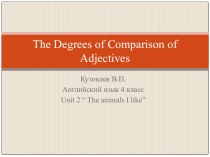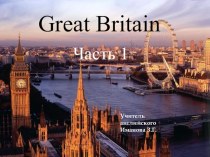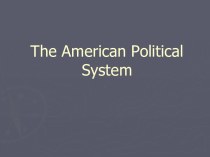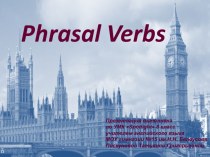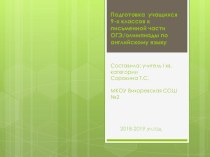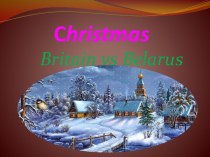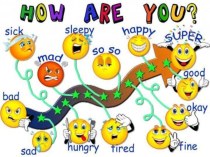- Главная
- Разное
- Бизнес и предпринимательство
- Образование
- Развлечения
- Государство
- Спорт
- Графика
- Культурология
- Еда и кулинария
- Лингвистика
- Религиоведение
- Черчение
- Физкультура
- ИЗО
- Психология
- Социология
- Английский язык
- Астрономия
- Алгебра
- Биология
- География
- Геометрия
- Детские презентации
- Информатика
- История
- Литература
- Маркетинг
- Математика
- Медицина
- Менеджмент
- Музыка
- МХК
- Немецкий язык
- ОБЖ
- Обществознание
- Окружающий мир
- Педагогика
- Русский язык
- Технология
- Физика
- Философия
- Химия
- Шаблоны, картинки для презентаций
- Экология
- Экономика
- Юриспруденция
Что такое findslide.org?
FindSlide.org - это сайт презентаций, докладов, шаблонов в формате PowerPoint.
Обратная связь
Email: Нажмите что бы посмотреть
Презентация на тему по английскому языку на тему: British Parliament
Содержание
- 2. About Parliament Parliament of the
- 3. History of Parliament United Kingdom
- 4. The modern era of Parliament
- 5. Privileges Each House of Parliament
- 6. Legislative functions Parliament of the
- 7. Judicial functions Queen-in-Parliament is the
- 8. Relations with the government. The
- 9. Скачать презентацию
- 10. Похожие презентации
About Parliament Parliament of the United Kingdom is the highest legislative body in the United Kingdom and the Royal Overseas Territories. It is headed by the British monarch. Bicameral Parliament comprises the upper house
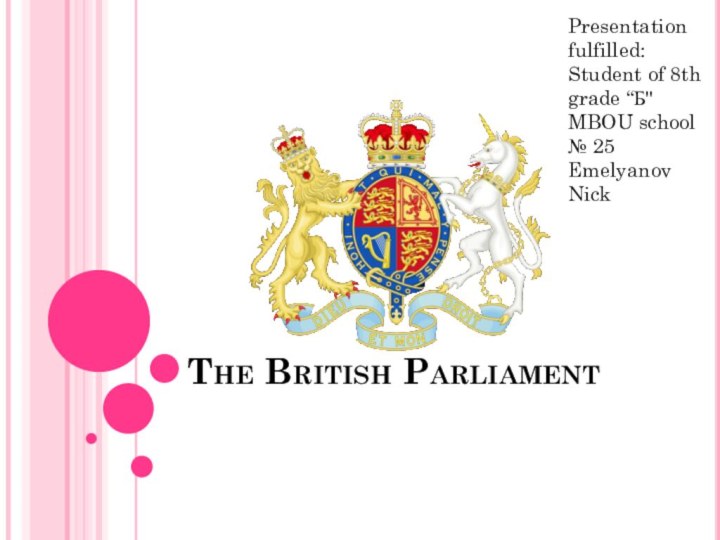



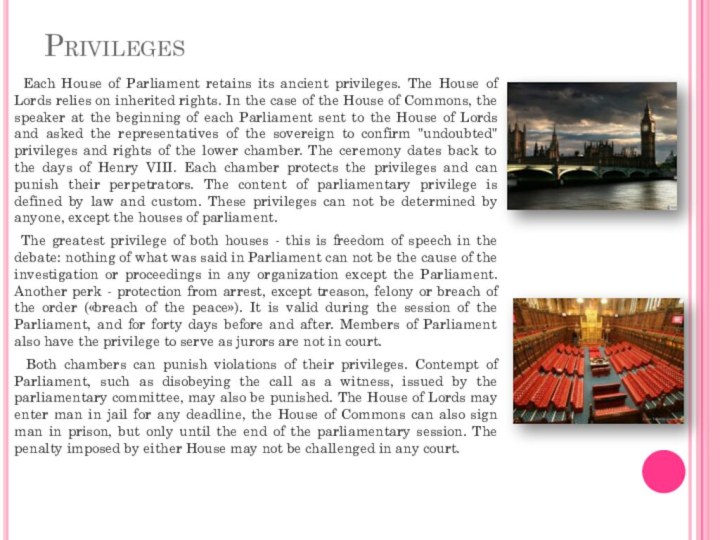
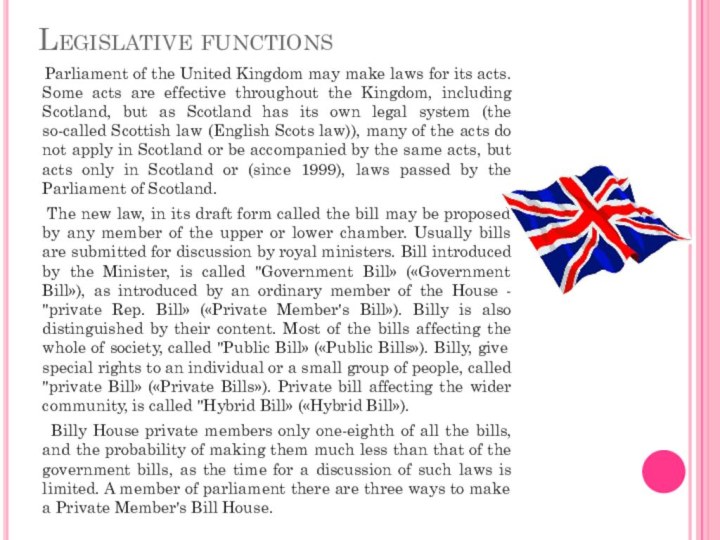
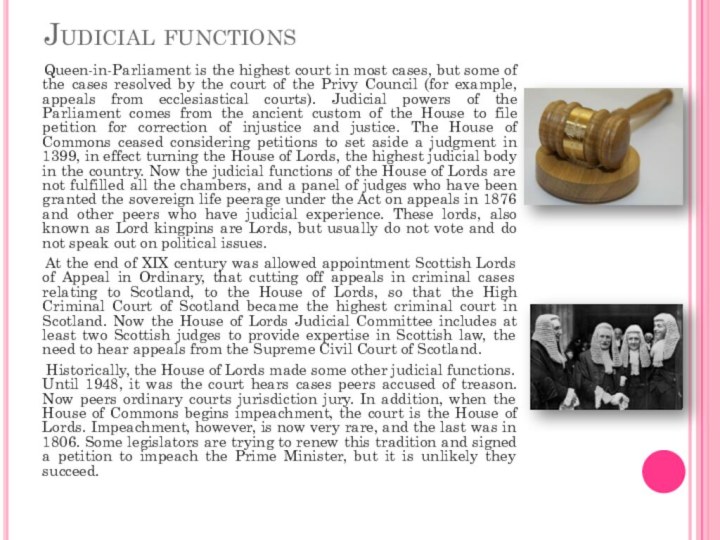

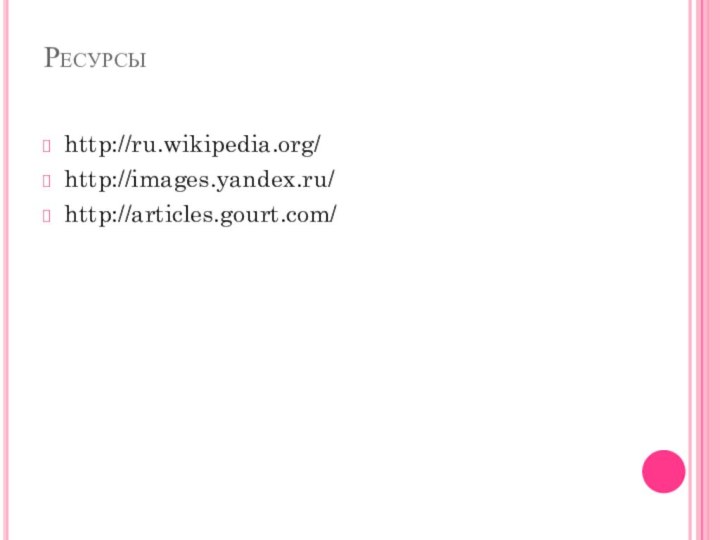
Слайд 3
History of Parliament
United Kingdom of
Great Britain and Ireland was created in 1801 by
the merger of the Kingdom of Great Britain and Ireland.The principle of ministerial responsibility to the lower chamber was developed only in the XIX century. The House of Lords House of Commons was higher both in theory and in practice. Members of the House of Commons were elected in an outdated electoral system, with widely varied dimensions of polling stations. In many cases, members of the House of Lords controlled the small polling stations, known as "pocket boroughs" and "rotten boroughs", and to ensure the election of their relatives or supporters. Many places in the House of Commons were the property of Lords. Also, at the time the election was widespread bribery and intimidation of voters. After the reforms of the nineteenth century (beginning in 1832), the electoral system has been significantly streamlined. No longer dependent on the upper chamber, the members of the House of Commons became more confident.
Слайд 4
The modern era of Parliament
The
rule of the House of Commons was clearly established
at the beginning of XX century. In 1909, the House of Commons passed the so-called "People's Budget", which introduced numerous changes to tax disadvantage for the rich landowners. The House of Lords, consisting of a powerful landed aristocracy, rejected that budget. Using the popularity of the budget and the unpopularity of Lords, in 1910, won the election the Liberal Party. Using the results of the election, the Liberal Prime Minister Herbert Henry Asquith proposed Act of Parliament, which was to limit the powers of the House of Lords. When the Lords refused to pass this law, Asquith appealed to the king to create several hundred Liberal peers to wash away most of the Conservative Party in the House of Lords. In the face of such a threat, the House of Lords took an act of Parliament, which allowed lords only delay the adoption of the law on the three sessions (reduced to two sessions in 1949), after which it comes into effect, despite their objections.The Irish Free State became independent in 1922, and in 1927 the United Kingdom was renamed the United Kingdom of Great Britain and Northern Ireland.
In the XX century has been further reforms: in 1958, the act of lifelong peers allowed the creation of life peers periodically. In the 1960s, the creation of inheritable peers was terminated and since almost all new peers were just life. House of Lords Act 1999 abolished the automatic right of hereditary peers to place in the upper house, with the exception of 92 peers.
Слайд 5
Privileges
Each House of Parliament retains
its ancient privileges. The House of Lords relies on
inherited rights. In the case of the House of Commons, the speaker at the beginning of each Parliament sent to the House of Lords and asked the representatives of the sovereign to confirm "undoubted" privileges and rights of the lower chamber. The ceremony dates back to the days of Henry VIII. Each chamber protects the privileges and can punish their perpetrators. The content of parliamentary privilege is defined by law and custom. These privileges can not be determined by anyone, except the houses of parliament.The greatest privilege of both houses - this is freedom of speech in the debate: nothing of what was said in Parliament can not be the cause of the investigation or proceedings in any organization except the Parliament. Another perk - protection from arrest, except treason, felony or breach of the order («breach of the peace»). It is valid during the session of the Parliament, and for forty days before and after. Members of Parliament also have the privilege to serve as jurors are not in court.
Both chambers can punish violations of their privileges. Contempt of Parliament, such as disobeying the call as a witness, issued by the parliamentary committee, may also be punished. The House of Lords may enter man in jail for any deadline, the House of Commons can also sign man in prison, but only until the end of the parliamentary session. The penalty imposed by either House may not be challenged in any court.
Слайд 6
Legislative functions
Parliament of the United
Kingdom may make laws for its acts. Some acts
are effective throughout the Kingdom, including Scotland, but as Scotland has its own legal system (the so-called Scottish law (English Scots law)), many of the acts do not apply in Scotland or be accompanied by the same acts, but acts only in Scotland or (since 1999), laws passed by the Parliament of Scotland.The new law, in its draft form called the bill may be proposed by any member of the upper or lower chamber. Usually bills are submitted for discussion by royal ministers. Bill introduced by the Minister, is called "Government Bill» («Government Bill»), as introduced by an ordinary member of the House - "private Rep. Bill» («Private Member's Bill»). Billy is also distinguished by their content. Most of the bills affecting the whole of society, called "Public Bill» («Public Bills»). Billy, give special rights to an individual or a small group of people, called "private Bill» («Private Bills»). Private bill affecting the wider community, is called "Hybrid Bill» («Hybrid Bill»).
Billy House private members only one-eighth of all the bills, and the probability of making them much less than that of the government bills, as the time for a discussion of such laws is limited. A member of parliament there are three ways to make a Private Member's Bill House.
Слайд 7
Judicial functions
Queen-in-Parliament is the highest
court in most cases, but some of the cases
resolved by the court of the Privy Council (for example, appeals from ecclesiastical courts). Judicial powers of the Parliament comes from the ancient custom of the House to file petition for correction of injustice and justice. The House of Commons ceased considering petitions to set aside a judgment in 1399, in effect turning the House of Lords, the highest judicial body in the country. Now the judicial functions of the House of Lords are not fulfilled all the chambers, and a panel of judges who have been granted the sovereign life peerage under the Act on appeals in 1876 and other peers who have judicial experience. These lords, also known as Lord kingpins are Lords, but usually do not vote and do not speak out on political issues.At the end of XIX century was allowed appointment Scottish Lords of Appeal in Ordinary, that cutting off appeals in criminal cases relating to Scotland, to the House of Lords, so that the High Criminal Court of Scotland became the highest criminal court in Scotland. Now the House of Lords Judicial Committee includes at least two Scottish judges to provide expertise in Scottish law, the need to hear appeals from the Supreme Civil Court of Scotland.
Historically, the House of Lords made some other judicial functions. Until 1948, it was the court hears cases peers accused of treason. Now peers ordinary courts jurisdiction jury. In addition, when the House of Commons begins impeachment, the court is the House of Lords. Impeachment, however, is now very rare, and the last was in 1806. Some legislators are trying to renew this tradition and signed a petition to impeach the Prime Minister, but it is unlikely they succeed.
Слайд 8
Relations with the government.
The UK
government is accountable to Parliament. However, neither the Prime
Minister nor members of the government are not elected by the House of Commons. Instead, the Queen asks the person using the maximum support chamber (which is usually the leader of the party that occupies the largest number of seats in the House of Commons), to form a government. That they are accountable to the Lower House, the Prime Minister and most of the cabinet members are selected from the members of the House of Commons, not the House of Lords. The last prime minister of the House of Lords was in 1963, Alex Douglas-Home. However, to perform custom, Lord Hume renounced his peerage and was elected to the House of Commons after he became Prime Minister.If the government had lost the confidence of the House of Commons, the Prime Minister must either resign or ask for the dissolution of parliament and new general elections. If the Prime Minister requests the dissolution of parliament, the sovereign may agree with this, and may refuse, forcing him to step down and allow the opposition leader to form a new government, although the latter is very rare.
In practice, the House of Commons is very little control of the government. Since a majority system of election, the ruling party usually has a large majority in the House of Commons and needs to compromise with other parties. Modern political parties in Britain rigidly organized, so that there is little freedom for the actions of their members. Often MPs expelled from their parties for voting, do not match their party leaders. During the twentieth century, the House of Commons only half expressed confidence in the government - twice in 1924 and once in 1979.


